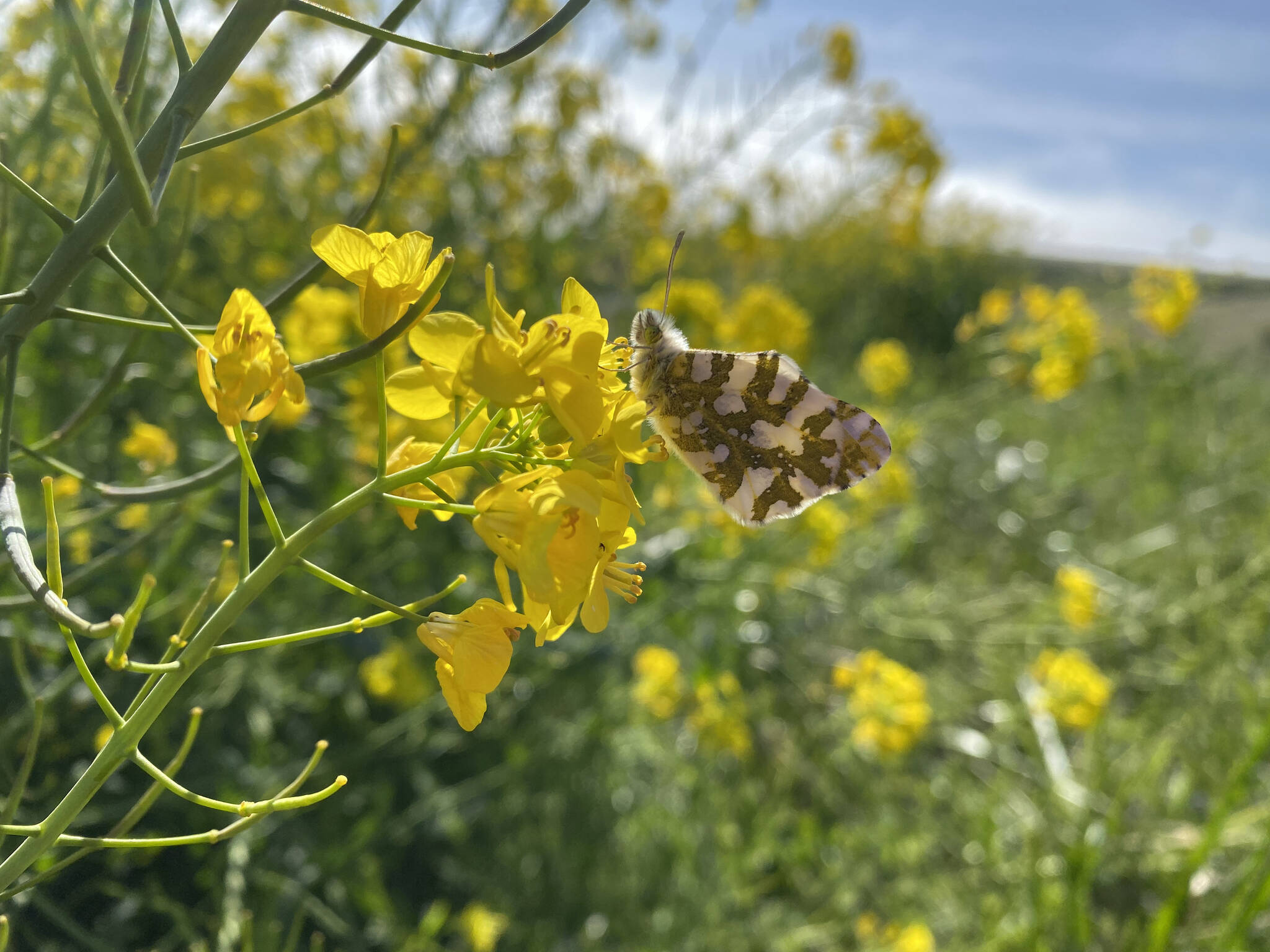Submitted by On Sacred Ground.
Until it was rediscovered on San Juan Island in 1998, the Island Marble butterfly (Euchloe ausonides insulanus) had been thought to have been extinct for ninety years. Currently only found on San Juan Island, this beautiful and rare species was, through concerted efforts, listed as endangered in 2020 by the U.S. Fish and Wildlife Service.
Recently, a new Island Marble butterfly Volunteer Program was created through a cooperative agreement between the USFWS and On Sacred Ground Land Trust. The program provides a central hub of volunteer activities to provide support for some of the work being done by IMB conservation partners. Volunteers are of vital importance to help expand and link habitat corridors on public and private lands in the San Juan Islands. Human intervention is necessary to save the IMB for these key reasons:
· The current small population needs the support of captive rearing to promote resilience in the face of climate change, seasonal habitat variation, habitat disturbance by humans, host plant sensitivities and predation.
· IMB habitat requires fencing to provide protection from deer and humans to complete all phases of its life cycle.
Agencies and Organizations Working Toward IMB Conservation Are:
On Sacred Ground is an islands-based non-profit with a permaculture approach to our interaction with our cherished planet. We are spearheading the IMB volunteer program, and plan associated long-term stewardship activities, such as our Leave No Trace Speaker Series. We are also currently working under a cooperative agreement with USFWS to scope for a second IMB captive propagation facility.
The San Juan County Conservation Land Bank is creating new habitats for the Island Marble butterfly on its preserves, including Zylstra Lake on San Juan and Fisherman Bay Spit on Lopez. The Salish Seeds Project, a joint program of the Land Bank and San Juan Preservation Trust, produces seeds and plants that are being used to improve the butterfly’s habitat at a variety of locations.
The San Juan Preservation Trust has managed three protected butterfly habitat patches since 2016 through grant funding from the USFWS and collaboration with local agencies. SJPT utilizes its staff and volunteer corps to plant and maintain patches of host and nectar plants for the butterflies, monitor their status, and expand outreach to the local community.
The San Juan Islands Conservation District is working directly with landowners to establish and maintain habitat that is known to support Island Marble reproduction. Youth Conservation Corps will also be having a hand in restoring IMB habitat.
Washington Department of Fish and Wildlife has been engaged with many partners to further IMB conservation since it was rediscovered in 1998. WDFW provides information, technical guidance, monitoring, habitat management and other conservation actions to reduce or remove threats and contribute to IMB recovery. One of WDFW’s conservation tools is the voluntary Candidate Conservation Agreement with Assurances with private landowners to manage and improve habitat for the butterfly. The CCAA currently covers 1,176 acres with a commitment to establish 31,914 square feet.
The Department of Natural Resources Natural Areas Program manages the Cattle Point Natural Resources Conservation Area in part to protect native ecosystems and rare species, including the IMB. Beginning in 2018, natural areas staff working with WDFW staff and other partners, began efforts to establish host and nectar plant populations on the NRCA in order to restore and enhance IMB habitat. This has been very successful to date, with butterflies nectaring and reproducing in these new patches.
The San Juan Island National Monument will actively seek to conserve, support and enhance IMB habitat.
The National Historical Park Service has actively reared the IMB in their onsite facility at American Camp on San Juan for over 10 years. The park collects and rears a limited number of IMB eggs and larvae annually and then releases newly emerged flying adults the following spring. The rearing and release operations are time-consuming and detailed; and the NPS has other IMB responsibilities including surveys to monitor population, IMB habitat protection, and habitat improvement and enhancement projects.
Most recently, the NPS has been developing a parkwide vegetation stewardship plan focused on preserving and repairing native ecosystems, habitats and vegetation communities that include conservation methods necessary for the recovery of IMB. As part of this process, the NPS began consultation with Coast Salish Tribes.
If you would like to sign-up as an IMB volunteer, please contact coordinator Walt Andrews at vc@onsacredgroundlandtrust.org or 360-375-3070. If you are a private landowner interested in adding habitat on your land, reach out to Paul Andersson of the San Juan Islands Conservation District at paul@sjicd.org or 360-378-6621.



